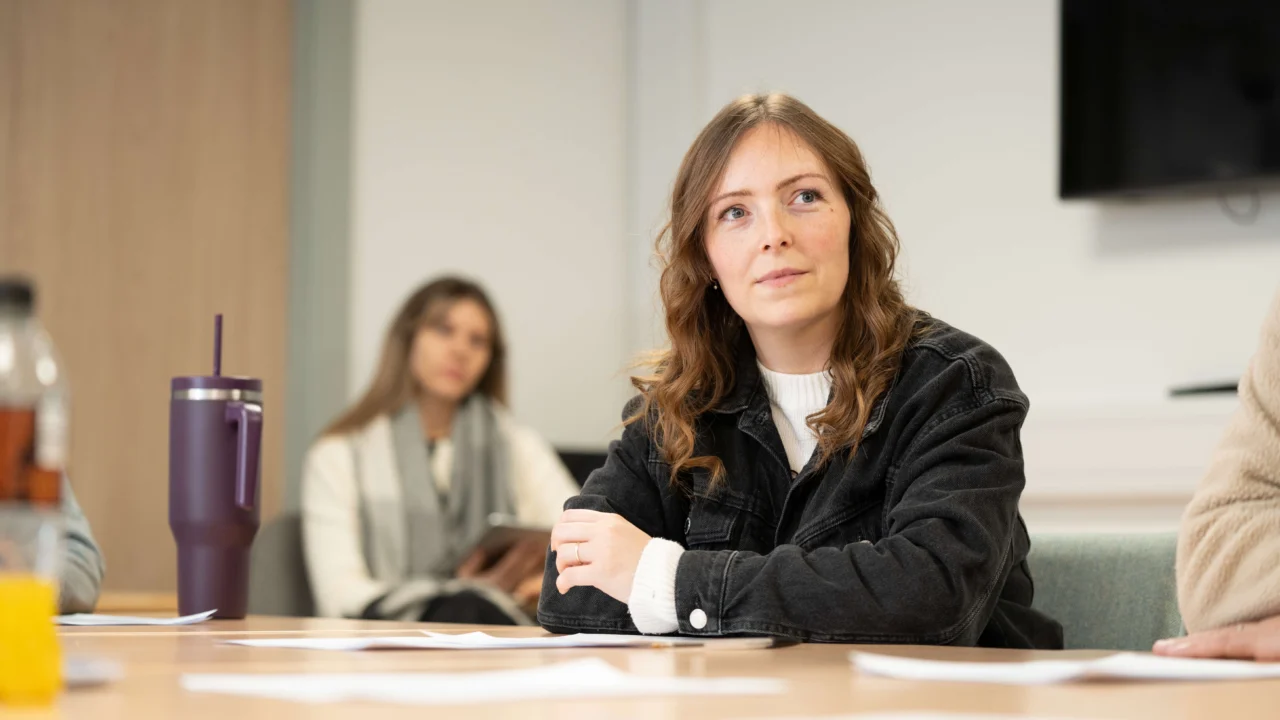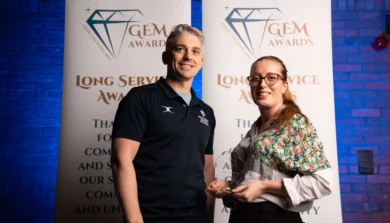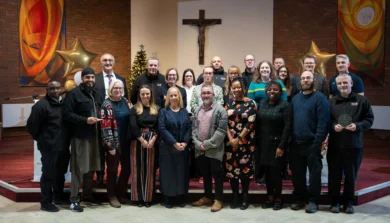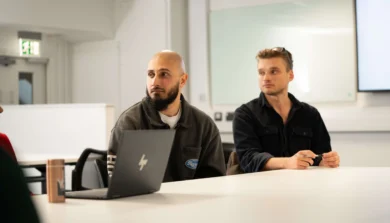Foundation Degree in Integrative Counselling
Foundation
- Start date
- –
- Study mode
- –
- Course length
- –
- UCAS Code
- –

Interested in a different start date?
Course Description
This is a professional training course that enables students to qualify as BACP registered counsellors. It enables students to engage with key theoretical approaches in counselling and related counselling skills, and to learn to integrate them in ways that allow them to be effective practitioners, equipped to work in a range of settings.
The course provides both professional and academic training, producing reflective practitioners who are equipped to meet the future challenges of the counselling profession.
This includes the inclusion of BACP online and phone therapy (OPT) competencies (BACP, 2021) as part of the training programme. The course is accredited by the British Association for Counselling and Psychotherapy (BACP) and subscribes to the BACP Ethical Framework (2018).
Entry Requirements
– Birmingham Newman’s Level 4 Introductory Certificate in Counselling, or a Counselling Certificate at level 3 (or equivalent), which normally includes a face-to-face counselling skills training and theoretical understanding
– Some experience of using these skills (such as active listening, empathy, open ended questions, responding appropriately) in a workplace or voluntary setting, such as a helping, listening or supporting relationship is expected
– Those without a level 3 qualification may apply for the Birmingham Newman’s level 4 Introductory Certificate in Counselling and then apply for entry onto the Foundation Degree.
Candidates must also demonstrate:
– Self-awareness, maturity and stability
– Ability to make use of and reflect upon life experience
– Capacity to cope with the emotional, intellectual and academic demands of the course
– Ability to form helping relationships
– Ability to be self-critical and use both positive and negative feedback
– Awareness of the nature of prejudice and oppression
– Awareness of issues of difference and equality
– Ability to recognise the need for personal and professional support
– Competence in, or the aptitude to develop generic professional skills, including: literacy, numeracy, information technology, administrative skills, self- management skills, communication and interpersonal skills
Additional costs
There are some additional fees associated with this course – these are outside of the course fees and self-funded. For example, the cost of clinical supervision (1 hour per fortnight whilst completing the 120-hour clinical hours), personal therapy (40 hours by the end of the course), student membership to the BACP for each year of your studies and professional indemnity insurance once in placement.
Additional Costs:
– Personal Therapy approx. £45-£65 per session
– Clinical Supervision approx. £45-£65 per session
– BACP student membership annual fee approx. £92 per year
– Professional indemnity insurance annual fee (costs vary between providers)
Why study this course?
The course is accredited by the British Association for Counselling and Psychotherapy (BACP)
It offers a distinctive training in integrative counselling, using an assimilative model of integration as a framework for practice with a person-centred core
The course combines academic study, personal reflection and counselling skills and practice with active clinical work in the second year of study.
On completion, you can progress to the?BA (Hons) ‘Top Up’ award in Counselling Studies,?thereby achieving a full Honours degree.
The course has a strong reputation and good relationships with a range of placement providers across the region.
Counselling, Psychotherapy & Talking Therapies Team
– Faisal Mahmood (Head of Subject (Counselling, Psychotherapy & Talking Therapies)
– Joanne Adams (Lecturer / Placement Manager)
– Kathryn Broome (Lecturer / Programme lead Introductory Cert Counselling)
– Stephanie Carr (Lecturer)
– Emily Evans (Senior Lecturer / Joint Programme lead FD)
– Carl Flynn (Senior Lecturer / Programme lead PWP)
– Sam Gallo (Senior Lecturer / Programme lead MSc Integrative Counselling)
– Kiran Kalsi (Lecturer)
– Karen Lee (Senior Lecturer)
– Linda Luckhurst (Senior Lecturer / Programme lead Advanced Diploma Psychotherapy)
– Awisha Magar (Lecturer)
– Bill Naylor (Senior Lecturer / Programme lead Counselling, MH & Wellbeing)
– Steve Roberts (Senior Lecturer / Joint Programme lead FD)
– Cassie Rowland (Lecturer)
– James Sedgwick (Senior Lecturer / Programme lead MSc in Integrative Psychotherapy)
– Rebekah Woodhouse (Senior Lecturer / Programme lead Joint Honours and Top Up)
– Sandra Boden – Senior Lecturer

Got a question you’d like to ask?
Course fees
The tuition fee for academic year 2026/27 is: £5,100. Tuition fees for courses starting April to May 2026, fall within the 2025/26 academic cycle.
Fees for the 2025/26 academic year can be found on our Student Finance pages.
Additional costs
The University will review tuition fees and increase fees in line with any inflationary uplift as determined by the UK Government, if permitted by law or government policy, in subsequent years of your course. It is anticipated that such increases would be linked to RPI (the Retail Price Index excluding mortgage interest payments).
Check out our blog/news/events

Birmingham Newman Celebrates Green Week 2026 with Campus‑Wide Events
Birmingham Newman will host its annual Green Week from 23 to 27 February 2026, bringing…

Research that makes a difference: Mark Holland wins Most Impactful Project Award
In December, we held our Staff Awards, where we recognised the outstanding achievements of colleagues…

Sports Coaching students Deliver Coaching Sessions for Local Primary Pupils
Birmingham Newman University recently welcomed pupils from St Peter’s Primary School to campus as part…

Vice-Chancellor Professor Jackie Dunne awarded MBE in New Year Honours
Vice-Chancellor of Birmingham Newman University receives an MBE for services to Higher Education.

Birmingham Newman University Celebrates Staff Achievements at Annual Awards
Birmingham Newman University celebrates its staff at the Annual Staff Awards Celebration.

Book an open day
Find out about our next open day. Book now to secure your place.
Clinical placement
During year 2 and year 3 of the Integrative Counselling Foundation Degree, students will engage with a supervised clinical placement. Students will work directly with clients in approved settings, helping them to build insight, confidence and a deeper understanding of relational practice. Placement opportunities are designed to help students apply theory to real-life scenarios and grow into an ethical and reflective counsellor.

Studying and living in Birmingham
At Birmingham Newman University, you’ll enjoy the best of both worlds: a peaceful, green campus that creates the ideal setting for focused study and personal reflection, yet remains just eight miles from the vibrant city centre.
As the UK’s second-largest city, Birmingham is also one of the youngest and most diverse in Europe, offering a dynamic blend of culture, innovation and opportunity. From world-renowned museums and music venues to a thriving food scene alongside a growing business and tech sector, it’s a place where creativity and ambition naturally thrive.
Experience Birmingham: A City full of possibilities
Whether you’re discovering the Midlands for the first time or already know the area well, Birmingham provides a lively and inclusive environment for students. As one of the most energetic and multicultural cities in the UK, it’s a place where you can grow academically while developing personally. Its rich cultural heritage, creative energy and broad range of opportunities make it an inspiring backdrop for your university journey.
A City that loves great food
Birmingham is a brilliant place to explore diverse culinary experiences. You might wander through the famous Balti Triangle, sample global street food at Digbeth Dining Club or enjoy a relaxed meal by the canals in Brindleyplace. The city is also home to independent cafés, vegan-friendly eateries and countless hidden gems. Whether you’re grabbing a quick bite between lectures or planning an evening out, there’s always something new to discover.
Arts, culture and entertainment
The city pulses with creativity. You could catch live music at the O2 Academy, experience a world-class performance at the Birmingham Hippodrome or browse exhibitions at the Birmingham Museum and Art Gallery. Creative spaces like the Custard Factory showcase local talent while hosting events that celebrate innovation. With festivals, sporting fixtures and cultural celebrations taking place year-round, there’s never a shortage of things to enjoy.
Simple & convenient travel
Getting around Birmingham is straightforward thanks to its well-connected public transport system. Buses, trams and trains make it easy to reach campus, explore the city or travel further afield. Whether you’re commuting daily or heading off for a weekend adventure, transport is both accessible and affordable.
Life beyond the lecture Hall
Your time at Birmingham Newman University extends far beyond academic study. You’ll have the chance to join student societies, contribute to community projects or try something entirely new. The University’s supportive atmosphere encourages you to build confidence, develop practical skills and feel genuinely at home throughout your studies.
View our campus
Our Careers team provides tailored advice, placements and workshops to help you build confidence and prepare for life after university.
Expected study hours
In year one, classroom teaching takes place between 10am and 5pm on Thursdays.*
You should expect to spend a further day engaging in independent study.
You will also need to allocate time for personal therapy.
In years two and three, classroom teaching takes place between 11am and 5pm on Wednesdays.*
You will undertake a supervised clinical placement and clinical supervision (as well as continuing with personal therapy and ongoing independent study). Your clinical placement will take place on a day when you are not taught on campus.
This is a thorough practitioner training and as such there are competing demands on your time during the course.
You will need to be able to complete academic work, whilst also completing clinical hours with your clients, accessing clinical supervision, organising your own personal therapy and study time.
Courses we think you'll also like

BA Single Honours Counselling, Mental Health and Wellbeing (with Foundation Year)
- Start date:
- Various

BA Counselling Studies and Working with Children, Young People and Families (with Foundation Year)
- Start date:
- Various

BA Counselling Studies and Working with Children, Young People and Families
- Start date:
- September 2026

BA Counselling Studies and Working with Children, Young People and Families
- Start date:
- September 2026
